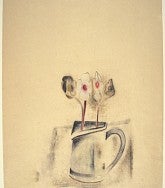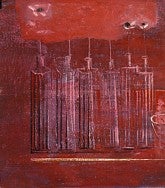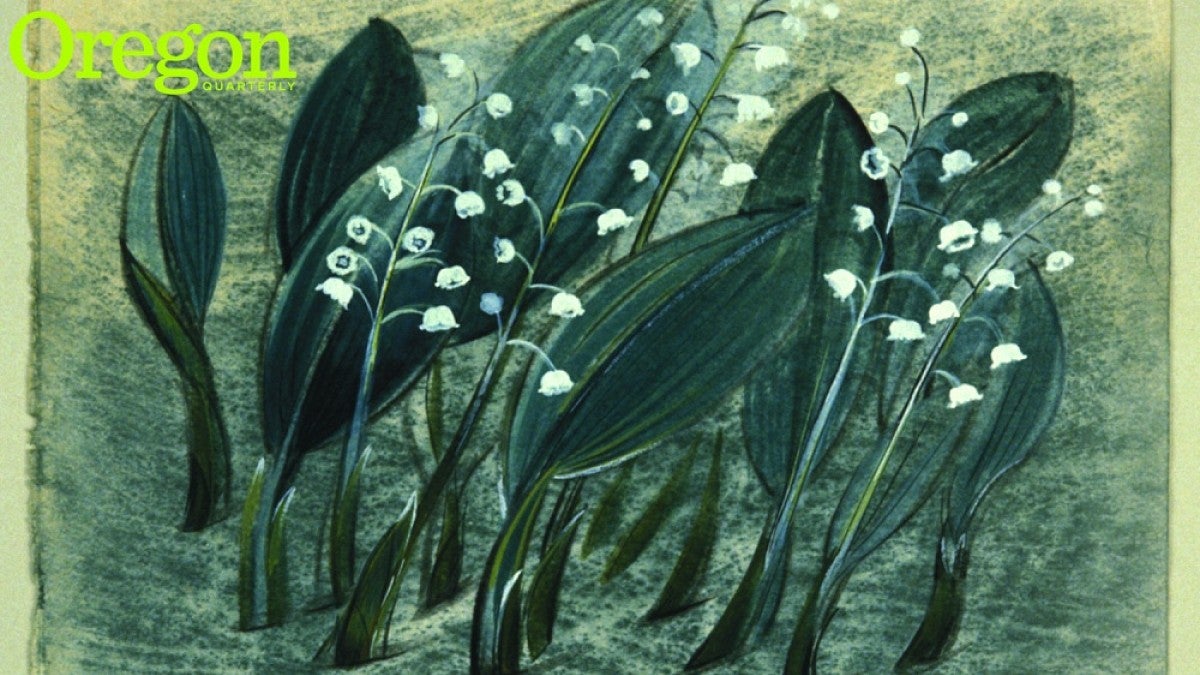Intimate personal letters can provide unmatched insight into the inner workings of their author's mind. The letters of noted Northwest painter Morris Graves (1910–2001) show a complex character pulled by competing, sometimes-contradictory impulses. While he desired an active social life, for example, he also sought out and enjoyed his solitary time, especially in nature, as is clear in the letters excerpted here from Morris Graves: Selected Letters (University of Washington Press, 2013) edited by Vicki Halper, formerly the modern art curator at the Seattle Art Museum, and Lawrence Fong '72, past curator of American and regional art at the UO's Jordan Schnitzer Museum of Art. With the extensive holdings of artwork by Graves at the JSMA and many of the artist's 40 cartons of letters now preserved in Knight Library's Special Collections and University Archives, the UO has become a center for Morris Graves studies.

Eureka, California, October 11, 1965
This Monday morning is such a glamorous sunshine day (after several overcast days) that I'm in a hurry to get back out to The Lake [the artist's home in the redwood forest near Eureka, California]. I've decided not to work out there today but just explore parts of the forest I've not yet taken time to explore. I did this for a couple of hours one day last week and discovered such beautiful great one-hundred-year-old mature white firs (my favorite of all forest trees) that on my way back to the cabin I got to wondering if I could ever make a path to them (instead of a trail)—a path that it might [be] possible to push you along in a wheelchair so you could see them. Something about these great old mature giant trees makes my heart go out to them. I love them more than my fellow man. Or so I feel sometimes. They stand in the forest with such serenity and character, their lives so resolved—so all-of-a-piece—and the forest is so deep and in places almost impenetrable that many of these great trees have never been seen by man. This gives them some deep quietude of their own, and, although you may think I'm waxing a bit emotional in this letter, I lean with my arms outstretched against these great trees when I discover them and my heart floods with tears of love for them. I am far from what's called a "naturalist" (or what's called a "bird-watcher") but I'm not far from what's called a "solitary." I love to be alone in nature where no one has ever been and where there's not a chance that someone is going to be.

La Conner, Washington, undated
Dear Wallace,
I am at La Conner alone for a few days' rest. . . .
East of town a mile or so . . . and on a wooded "pleasant ridge" in the cemetery and . . . a few times I have been there during the years to see the lichened markers—and think those thoughts that marvel at the names and dates (1880). Seems old and bleak—but more—those thoughts more full of poignant sadness than an 1880 plush family photo album—more full of sadness that's like sudden sharp despair and grief. . . .
It occurred to me while marveling at the whole sight of this little cemetery that I'd make autumn bouquets of wildflowers for everybody there—the roadside rows of weedy Michaelmas daisy and late clover and lupin, etc., would make sweet little nosegay-like bouquets. So I decided to do this and, rain or shine, return with them today. In my feelings and thoughts about this plan, I somewhat fancied for myself to move at a rhythmical pace—not even slightly meditative—as I, careless of names or bramble-lost graves—or recent flower decorations left by families—moved from one to the next to the next to the next, impartially placing an equal bouquet in an equal unpausing rhythm—like a dance, a dance leaning from left to right across a stage. . . .
I drove to the cemetery, parked at the gate, lifted out the box and immediately announced, calling aloud—and quite aloud—"Autumn bouquets for everybody!" (Oh lonely.) (Like a lone dance.) I placed one and then the next and then the next, saying, "Flowers for you—and for you—and for you—and for you—rest, sweet souls—rest, rest, dear souls—I love you—it is late summer—it is autumn—the sun shines, the air breathes—you have autumn crows and now also this little new bouquet—you are clothed over with a sheet of ivy—you with a sheet of stone—you with a fallen iron fence—you with dry grass—you with dry lawn, you with brambles, you with a fallen marker—this little bouquet for you—and this one for you—for you, dear—are you a child?—are you a boy?—are you a man?—were you young?— were you old?—were you lonely and caught in the drift of this life too?—did you love the wind? and this autumn sun?"
I felt marvelously glad that I had done it. I felt sad too. I felt kind of charmed by this sadness, and so I held the pause—the rhythm was over.
—Edited by Vicki Halper


